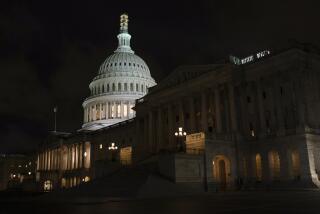GOP Sees Need for Political Repairs
- Share via
WASHINGTON — Even as they congratulate themselves on maintaining their hold on Capitol Hill, Republican leaders are striving to learn the lessons of a 1996 campaign that kept them out of the White House for another four years.
Lesson One, as one advisor to GOP presidential candidate Bob Dole put it, is for the party’s congressional leadership--especially in the House--to adopt a less aggressive approach to policy-setting. The advisor, Don Devine, said Republicans made an “enormous tactical error” last year when they “tried to run the government from Congress when the Constitution doesn’t allow you to govern from Congress.”
Lesson Two is that the electoral message that served Ronald Reagan so well--founded on fear of communism and big government--needs adjustment to a new era in which the “Red menace” has all but vanished and even Democrats decry the growth of government.
Finally, Republicans say they would like to find some way to restructure a nominating process that critics--citing the nominations of Dole and, before him, George Bush--say serves more as a system for rewarding party stalwarts than for choosing the most effective candidate to go up against the Democrats.
Even as such ruminations proceed, political scientists note that given the severe constitutional limitations on party organizations, Republican leaders may have a hard time benefiting from their ’96 experience. That’s because that party, as an entity, can do little to change the behavior of individual politicians and the various interest groups that comprise its membership.
“Our political parties are reactive institutions, not proactive,” said Charles Jones, a University of Wisconsin political scientist.
Still, GOP leaders and activists hope to find some ways to deal with some of the problems this campaign exposed.
The immediate focus will be on how the party pursues its agenda on Capitol Hill. Its controversial efforts in 1995, Devine said, gave Clinton his main rationale for remaining in office, which was that “those Republicans may be doing good things, but we need to keep them from going too far.”
Devine said party congressional leaders “are going to have to be much smarter” in dealing with such sensitive issues as Medicare and other entitlement programs, where their efforts to cut spending growth caused them serious political damage. “They are going to have to step back and let Bill Clinton try to lead,” Devine said.
This problem may solve itself, because most Republicans expect the House--which spearheaded the ’95 congressional agenda--to be less influential than the Senate in the next Congress.
“Much of our leadership in the next two years will come from the Senate rather than the House,” said American Conservative Union chairman David Keene.
Not only did the GOP gain at least one Senate seat, but a number of the newly elected Republicans, notably Jeff Sessions of Alabama, Tim Hutchinson of Arkansas, Wayne Allard of Colorado, Sam Brownback of Kansas and Mike Enzi of Wyoming, are expected to be significantly more conservative than the incumbents they are replacing.
And on the House side, not only has the GOP contingent been shrunk by nine seats or so, but House Speaker Newt Gingrich may find himself distracted by a House ethics investigation.
So far as the party’s message is concerned, advice already is forthcoming.
Don Sipple, a former media advisor to the Dole campaign, contends the party needs “a new and fresh message for national Republicans” that would speak to public concerns about crime, teenage drug use and the quality of public education.
Ralph Reed, head of the Christian Coalition, said the GOP “can no longer allow presidential campaigns to be run by Washington lobbyists and by inside-the-Beltway consultants who are either uncomfortable with moral and social issues or have a tin ear when it comes to reaching out to religious conservatives.”
And John Pitney, a political scientist at Claremont McKenna College, said Republicans have to learn to think more positively. As an example, he said, “beyond simply coming out against the welfare state, Republicans have to explain what they are going to replace it with.”
The GOP’s presidential nominating system proved particularly frustrating to conservative activists such as Reed. “There is a growing sentiment in the religious conservative community that we cannot allow the nomination of the Republican Party for president to simply go to the person who has waited the longest and is the next in line.”
One reason GOP stalwarts such as Dole tend to get nominated is that they have the best contacts with party leaders--and thus the best-financed campaigns, an advantage made even more important in 1996 by the front-loaded primary schedule.
In a move aimed at reversing the trend of early primaries, the Republican Party’s rules committee voted this summer to award bonus national convention delegates to states that delay choosing a nominee until later in the spring.
More to Read
Sign up for Essential California
The most important California stories and recommendations in your inbox every morning.
You may occasionally receive promotional content from the Los Angeles Times.










